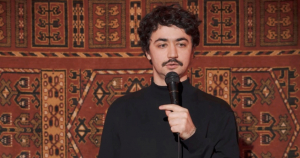
Comedian banned for life from Russia after joke

When Russia first started to brand media outlets ‘foreign agents’ and ‘undesirable organizations’, the joke was that we would soon see ‘undesirable’ individuals’. Sadly, it wasn’t long before the joke became reality. The Russian Interior Ministry designated stand-up Belarusian comedian Idrak Mirzalizade ‘undesirable’ Monday and said he was barred from entering Russia for the rest of his life.
What happened
- Mirzalizade appeared with other comedians in a YouTube show earlier this year in which he joked about the xenophobia he encountered when renting a Moscow apartment. The punchline played on the fact that many landlords demand ‘Slavs only’ in apartment listings, yet it is often the Slavs themselves that trash rented properties. That’s an abbreviated version — you can see the whole joke (in Russian) here and judge for yourself.
- Xenophobia is alive and kicking in Russia today and a man with a ‘foreign sounding’ name like Idrak Mizalizade could hardly have escaped becoming a victim. Many advertisements on Russia’s biggest rental property websites openly state ‘Slavs only’ (remember that many Russians are not Slavs). In many countries, this would be illegal.
- For several months, nobody paid any attention to Mirzalizade’s joke. Then, suddenly, it became a ‘scandal’ and Mirzalizade was attacked by far-right hate group Male State and pro-Kremlin media. Vladislav Pozdnyakov, the leader of Male State, urged supporters to demand that Mirzalizade be branded ‘undesirable’ and kicked out of Russia.
- A few days later, the comedian was attacked in a Moscow street. Then, the police opened a case into the incitement of interethnic hatred and Mirzalizade was jailed for 10 days. This was the first time in contemporary Russia an individual had been put in prison for telling a joke.
- Mirzalizade protested his innocence and apologized to anyone who was offended. He said the joke was about the stupidity of judging an entire nation (in this case, Russia) on a single individual. But officials were not impressed. Mirzalizade — who is a Belaursian citizen — was labelled ‘undesirable’ by the Interior Ministry on Monday and banned from Russia for life. There was no need to deport him, however, as he had already left the country — a friend of the comedia said Mirzalizade was not in either Belarus or Russia.
Why ban a comedian?
- It’s very rare that an individual is labelled ‘undesirable’ by the Russian authorities, but it does happen. One of the first cases was in 2007 when New Times journalist Natalie Morar was banned from the country. The same law was used to stop rock group The Bloodhound Gang from entering Russia after a show in Ukraine in which the bassist mimed wiping his backside with a Russian flag. But this is the first time a comedian has been branded ‘undesirable’.
- We can only speculate on the reasons. Artur Chaparyan, another popular stand-up comic and a friend of Mirzalizade, suggested that, in the build-up to parliamentary elections this month, the authorities want to play the ‘nationalist card’. He said Mirzalizade is of the same opinion.
- But there are other theories. The decision might be a warning to other stand-up comics to stop dabbling in politics. Or it could be the revenge of Igor Sechin, the head of state-owned oil giant Rosneft, after a Mirzalizade’s joke that he would take Sechin’s portrait to a rally to frighten the cops. Sechin is notoriously sensitive to criticism.
Who is Mirzalizade?
- Mirzalizade is best known as a resident comic at ‘Stand-up Club #1’, an association of independent Russian comedians.
- Stand-up comedy is a relatively new phenomenon in Russia. For many years, TV program KVN (and its namesake student group) had a monopoly on comedy shows (KVN dates back to the Soviet era and its 80-year-old host has been in the job for 30 years). KVN graduates often went on to work on state-owned television comedy shows. In the 1990s, there was a strong political satire element to KVN, but this has dwindled to nothing.
- In recent years, stand-up acts have begun to gain a new popularity. Several stand-up comedians have been interviewed by Russia’s most popular YouTuber, Yuri Dud, and made appearances on big entertainment shows. In contrast with other TV comedians, they joke about politics and are not shy of saying what they think. Most of the leading comics are also residents at Stand-up Club #1.
Why the world should care: It’s entirely possible we will see similar expulsions in the future — the toolkit for tackling people disliked by the Russian regime is always growing. BBC journalist Sarah Rainsford, who worked in Russia for 20 years, was also expelled this week after being told she was a “threat to national security”.




